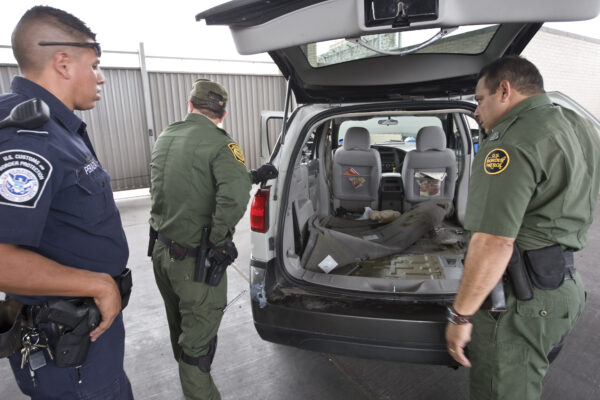Two new laws went into effect January 1, 2020 in California create new rights and protections for sex workers in both legal and criminalized sectors. AB 5 affects many employees in various legal professions, including legal sex work. SB 233 creates new protections for sex workers reporting violent crime, and prevents condoms from being used as evidence.
AB 5 – Employee Classifications for Strippers and Erotic Dancers
AB 5 – Employee Classifications for Strippers and Erotic Dancers
Many sex workers working in legal activities in California, such as strippers, are improperly treated as independent contractors by their employers. A recent law passed in California in 2019, AB 5, sets out the rules for how to figure out if someone is an employee or an independent contractor.
WHY DOES IT MATTER IF A WORKER IS PAID AS AN INDEPENDENT CONTRACTOR?
Employees often have more protections under the law than independent contractors. Some of these include:
- entitlement to minimum wage and overtime
- lunch breaks, rest breaks, and other wage and hour benefits
- paid sick leave and paid family leave
- anti-discrimination and harassment protections
- worker's compensation and unemployment insurance
- employer payment of certain taxes
- eliminating fees clubs may charge dancers to rent the stage or the DJ
- ability to get help from state agencies like the Labor Commission for wage disputes
WHAT KIND OF WORKERS ARE EMPLOYEES VS. INDEPENDENT CONTRACTORS?
To treat a worker as an independent contractor rather than an employee, an employer must show all of the following 3 factors:
Note: the law exempts certain kinds of professions from its coverage. Currently, strippers and exotic dancers are not exempted.
- The worker is free from control and direction in the way they do their work.
For example, at a strip club, these are relevant questions to show the club may control the work:- Does the club control what the dancer wears?
- Does the club control the music or the routine?
- Does the club control how many hours or shifts they work?
- Does the club control if they work the stage, a private room, or the floor?
- Does the club require dancers to earn a minimum amount in tips, solicit a minimum amount of drink orders, or give a minimum number of lap dances?
- The person performs work that is outside the usual course of the business.
- For example, a plumber hired by a strip club to fix a sink would be performing work outside the usual course of the club’s business and would likely be an independent contractor. If an erotic dancer would be doing work that is central to a club’s business, it is likely the dancer will be considered an employee.
- If a club advertises that it provides adult entertainment, strippers, dancers, exotic dancers, etc., and/or patrons come primarily to see dancers, and/or a club features performances every night and consistently employs dancers, it is likely that the strippers’ work is within the usual course of business and that they are employees.
- If the club has features specifically for strippers, such as stages, poles, lights, and props, that also indicates that stripping is part of the usual course of business.
- The person is customarily engaged in an independently established trade, occupation, or business of the same nature as that involved in the work performed.
- Do dancers try to get work from other businesses or individuals?
- Can the dancer be their own boss?
- Do they have their own business cards, e-mail or phone number for business purposes?
- Do they receive income from other sources for their dancing?
DOES IT MATTER WHAT THE CONTRACT SAYS?
Even if someone has a contract that says they are an independent contractor, if the conditions of the work fit the description of an employee, they will be considered an employee.
WHAT DO I DO IF I THINK MY EMPLOYER IS MISCLASSIFYING ME?
You can contact a private employment attorney for advice about your options, or a member of the Coalition of Low Wage and Immigrant Worker Advocate.
Some options include:
A worker can file one or more of the following:
- Filing a wage claim with the Labor Commissioner’s Office
- Reporting a Labor Law Violation to the Labor Commissioner’s Office for widespread violations affecting a group of workers
- Filing a lawsuit in court
FOR MORE INFORMATION ABOUT AB 5, CHECK OUT
SB 233 – New Protections for Sex Workers in California
In 2019, California passed a historic harm reduction bill for sex workers, SB 233. This new law aims to improve the health and safety of people in the sex trade by:
- Ending the practice of using “condoms as evidence” of prostitution.
- Giving people the power to report a crime that they’ve experienced or witnessed without being arrested or prosecuted for related sex work or misdemeanor drug offenses.
NO CONDOMS AS EVIDENCE
CAN CONDOMS BE USED AGAINST ME FOR SEX WORK-RELATED CRIMES?
No. The police cannot confiscate your condoms and use them as probable cause to arrest you for creating a public nuisance, solicitation for prostitution, and/or loitering with the intent of prostitution.1 Prosecutors cannot use condoms to bring sex work-related charges against you. If the police take your condoms or if prosecutors try to introduce condoms as evidence to prove you were engaged in sex work, contact the ACLU affiliate in your region or the public defender’s office in your county.
HOW MANY CONDOMS CAN I CARRY ON ME AT A TIME NOW?
You are free to carry as many condoms as you need or would like for your own safety and protection. Condoms can no longer legally be used to profile you and arrest you for sex work.
DID SB 233 DECRIMINALIZE SEX WORK?
No. Solicitation and other sex work-related offenses are still illegal in the state of California and may be punishable by up to 6 months in jail and a $1000 fine. SB 233 grants immunity from arrest and prosecution for sex work-related and misdemeanor drug offenses and prevents police from confiscating and prosecutors from using condoms as evidence of prostitution. However, police officers still may try to use other ways to apprehend you, including the way you are dressed, your gender identity or expression, the time of day, and the neighborhood you are in.
WHAT DO I DO IF I'M STOPPED BY THE POLICE?
- Ask, "Am I free to go?" If they say 'yes,' leave calmly. If they say 'no,' ask to know why by saying, "Can you tell me why you are stopping me?"
- Make sure the officer knows you do not agree to be searched. Say “I do not consent to a search.” Police may “pat down” your clothing if they suspect a weapon, but remember they cannot take your condoms. If they confiscate or photograph your condoms, contact the ACLU affiliate in your region or the public defender’s office in your county.
- If the police arrest you, exercise your right to remain silent. Say “I want to remain silent.” You cannot be punished for refusing to answer questions and the police cannot ask you about your immigration status.2
IMMUNITY FROM ARREST AND PROSECUTION WHEN REPORTING A CRIME
WHAT DOES IMMUNITY FROM ARREST MEAN?
Under SB 233, if you report being a victim of or witness to a serious felony, including but not limited to, assault, robbery, kidnapping, domestic violence, extortion, human trafficking, sexual battery, or stalking, you cannot be arrested for the sex work or misdemeanor drug offense you were engaged in at or around the time of the crime.3
DO I HAVE TO BE THE VICTIM OF THE CRIME I REPORT TO THE POLICE TO GET IMMUNITY?
No. SB 233 also grants you immunity if you come forward to report a serious felony that you witnessed to someone else at or around the time you were engaged in sex work or a misdemeanor drug offense.
DO I HAVE TO REPORT THE CRIME I WITNESSED OR EXPEREINCED RIGHT AWAY?
No. You can come forward as victim or witness to a serious felony at a later time. However there are statute of limitations for some crimes, and evidence may disappear, so you may want to get advice from an attorney or victim advocate on how long you have to report.
DO I HAVE TO COOPERATE IN THE CRIMINAL INVESTIGATION ONCE I REPORT THE CRIMINAL ACTIVITY?
No. You can stop cooperating with the investigation at any time without losing your immunity.
CAN I BRING SOMEONE WITH ME IF I WANT T REPORT THE CRIME?
Yes. It is a good idea to bring someone with you to make sure you are treated properly when you report. Advocates from a local anti-sexual assault organization or sex worker rights organization may be able to accompany you when you make a report.
ARE THERE QUESTIONS I SHOULDN'T ANSWER WHEN REPORTING A CRIME?
Yes. The police should not ask you and you should not answer questions about your immigration status. If you have other questions about what information to share, you should get advice from an attorney or victim advocate.
WHAT SHOULD I DO IF I AM MISTREATED OR ABUSED BY THE OFFICERS WHO ARE INTERVIEWING ME? FOR EXAMPLE, WHAT IF OFFICERS ASK ME FOR SEXUAL FAVORS?
You can make a complaint about police misconduct. A victim-witness assistance organization may be able help you file complaint. Every police department has its own process for receiving these types of complaints. There may be a civilian oversight board of your police department or there may be an internal process within the police department. Most police departments provide information about how to submit a complaint on their website.
IF I REPORT A CRIME, AND IT INVOLVES OTHER SEX WORKERS WHO DON'T WANT TO BE A WITNESS, CAN THEY BE PROSECUTED?
No. The law stops evidence that a person was engaged in sex work from being used against them. If you report a crime, other people are not required to cooperate as witnesses, so sex workers who don’t want to be witnesses cannot be prosecuted for prostitution. However, they could be subpoenaed to testify, and risk arrest if they do not show up to court.
ARE CLIENTS ALSO GRANTED IMMUNITY FROM PROSTITUTION RELATED CHARGES?
Yes. If the clients were a witness or victim to a serious felony around the time they were clients, they should also be protected from arrest or prosecution for prostitution.
SB 357 New Protections for Sex Workers in CA
In 2022, California passed SB 357, the Safer Streets for All Act. The law aimed to improve the health and safety of sex workers and people perceived as sex workers in two ways:
- Police could no longer arrest people for violating Penal Code section 22, loitering for prostitution.
- People that have been arrested and convicted of loitering for prostitution can clear their records.
However, in 2025, California rolled back some of those changes.
New as of 2026:
In 2025, California passed AB 379, which created a new misdemeanor—Penal Code § 653.25—which makes it a crime to loiter in a public place with the intent to purchase commercial sex. According to the bill, intent can be shown by:
- “Circling an area in a motor vehicle and repeatedy beckoning to, contacting, or attempting to contact or stop pedestrians or other motorists;”
- “Making unauthorized stops along known prostitution tracks;” or
- “Engaging in other conduct indicative of soliciting to procure another to engage in commercial sex.”
This law is intended to apply only to purchasers. The previous law banning loitering with intent to engage in prostitution (Penal Code § 653.22) remains repealed. People cannot be arrested for loitering with intent to sell sexual services. And people with prior § 653.22 convictions can still have their records cleared.
DID SB 357 DECRIMINALIZE SEX WORK?
No. Prostitution and other sex work-related offenses, such as pimping, pandering, or lewd conduct in public, are still illegal in the state of California. SB 357 created new protections for sex workers by repealing a harmful anti-loitering policy that enabled police to target and arrest people, particularly sex workers of color, on the basis of “loitering with intent to commit prostitution.” Still, police officers may try to use other ways to arrest you, such as if they witness you taking cash in exchange for engaging in sex work, agreeing to engage in sex work, or engaging in sex work.
Can I be arrested for loitering again?
Starting January 1, 2026, police can arrest or cite people for loitering with the intent to purchase commercial sex under Penal Code § 653.25.
This new law is intended to target purchasers of sexual services, not sex workers. It does not recriminalize loitering with intent to sell sexual services (Penal Code § 653.22), which remains repealed.
What do I do if I’m stopped by the police?
Ask, “Am I free to go?” If they say ‘yes,’ leave calmly. If they say ‘no,’ ask why by saying, “Can you tell me why you are stopping me?”
Make sure the officer knows you do not agree to be searched. Say, “I do not consent to a search.” Police can “pat down” your clothing if they suspect a weapon, but remember they cannot take your condoms as condoms may not be used as evidence of prostitution. If they confiscate or photograph your condoms, contact the ACLU affiliate in your region or the public defender’s office in your county.
If the police arrest you, exercise your right to remain silent. Say, “I want to remain silent.” You cannot be punished for refusing to answer questions and the police cannot ask you about your immigration status.[1]
ACLU NorCal Legal Intake Line: (415) 621-2488
ACLU SoCal Legal Intake Line: (213) 977-5253
Office of the State Public Defender: (510) 267-3300 or (916) 322-2676
[1] Cal. Gov’t Code § 7284.6 (2018)
Clearing Your Record
I am currently serving a sentence in jail, am under probation or under community supervision for the charge of “loitering with the intent to engage in prostitution.” What can I do?
Under SB 357, you may request to have your sentence recalled, dismissed entirely and cleared from your record, and sealed, meaning you can treat the conviction as though it never occurred.
I have an old charge, and already served my sentence for loitering with the intent to engage in sex work. Am I eligible to get my record cleared?
Yes. Under SB 357 you are eligible to request to have your conviction cleared and sealed. Clearing and sealing your record can increase your access to employment, housing, public assistance, and education.
- Note, these record-clearing provisions apply only to prior Penal Code 653.22 (“loitering for prostitution,”) convictions (repealed as of January 1, 2023).
The new § 653.25 (“loitering with intent to purchase sex”) offense (as of January 1, 2026) does not qualify for these record-clearing provisions.
Will getting my record cleared help for immigration purposes?
Can I get rid of my arrest record for loitering with intent to commit sex work?
If you were previously arrested but never convicted (which could mean that no charges were filed, charges were dismissed, or you went to trial and were found not guilty), then your arrest records can be sealed and destroyed, meaning they would no longer be available to the public and your arrest can be treated as though it never occurred.[1]
[1] Cal. Penal Code § 851.8(b) (2019)
How can I request to get my record cleared and sealed?
You can get your record cleared and sealed by contacting the Public Defender or legal aid in the county where you have convictions.
Other Resources:
1. Cal. Evid. Code § 782.1; Cal. Penal Code §§ 372; 647 (a)(b); 653.22 (2020). ↑ Go back
2. Cal. Gov't Code § 7284.6 (2018). ↑ Go back.
3. Cal. Penal Code § 647.3 (2020). ↑ Go back.
Stay Informed
Sign up to be the first to hear about how to take action.
By completing this form, I agree to receive occasional emails per the terms of the ACLU’s privacy statement.
By completing this form, I agree to receive occasional emails per the terms of the ACLU’s privacy statement.



